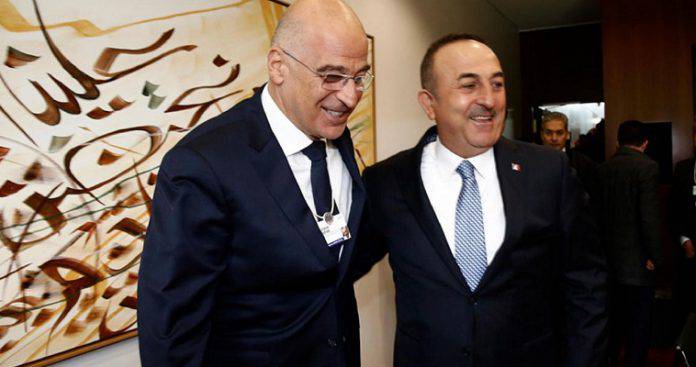Vaggelis Sarakinos: What Cavusoglu’s move means – Communication with Dendias and developments in Ankara
09/11/2020
The post-Trump era may still not be here yet, however, Cavusoglu’s latest move to contact Nikos Dendias in order to investigate the possibility of a meeting cannot be seen apart from this. The change of leadership in the US is estimated to worsen Ankara-Washington relations, while Erdogan is exposed in Europe after his feud with Macron and the lira is in constant decline. A few hours ago, the thriller became more intense with the resignation of the Minister of Finance, who is also Erdogan’s son-in-law.
On Sunday afternoon, it became known that the Turkish Foreign Minister requested and had contact with his Greek counterpart, in which they discussed the conditions, under which a meeting would be possible in the near future. The communication, according to diplomatic sources, took place on the initiative of Cavusoglu and during the discussion, Nikos Dendias reiterated the firm Greek position that as long as the Turkish provocative actions continue, there can be no dialogue.
Cavusoglu’s move does not necessarily mean that Turkey will back down from its irrational claims and illegal actions in the Eastern Mediterranean, Cyprus, and the Aegean. However, it is taking place in a particularly unfavorable situation for Ankara, which is affected by an apparent change of attitude of Berlin and the victory of Biden in the American presidential elections.
Cavusoglu initiative
The initiative of the Turkish Foreign Minister was a preordained failure since the Greek positions on the prospect of dialogue between the two countries are known. It is also self-evident that no talks can take place with Ankara, as Turkey maintains illegal Navtex in force and Erdogan prepares to go on a picnic in Famagusta.
Cavusoglu’s move comes, however, after several days of silence by the Turkish leadership over the aggressive and often belligerent rhetoric of government officials and Erdogan himself against Greece and Cyprus. However, it comes after many small and big defeats of the Turkish president in his confrontation with Greece and Europe.
A few days ago, Ankara’s illegal attempt to change the operational regime regarding rescue operations in the Aegean failed. In a statement, the secretary of the International Civil Aviation Organization (ICAO) clarified that nothing has changed in terms of boundaries and responsibilities for search and rescue operations within the SAR in Athens. He also clarified that such a thing can not be done without the consent of Greece, effectively annulling the regulation voted unilaterally by Turkey.
Erdogan is in difficult times
Erdogan’s “waterloo” was, however, his confrontation with Macron and his attempt, through it, to turn the Muslim world, Arab and non-Arab, against Europe. But he found a united Europe against him, which was further strengthened after the jihadist attack in Vienna.
Now, even the initially hesitant Berlin is showing a willingness to change its stance on Turkey, something that is expected to become more apparent after Biden’s victory in the US presidential election. At the same time, developments in Libya, while not eliminating the Turkish presence, have already limited Erdogan’s active involvement, including in Syria, where Turkish forces withdrew from a base last week.
Cavusoglu’s move towards Athens, however, comes at a time when the Turkish economy is on the verge of bankruptcy with the lira collapsing and moving to historically low levels against the dollar. Many analysts estimate that the Turkish currency will come under further pressure from a possible, for many, deterioration of US-Turkish relations following the change of leadership in Washington.
What’s up with Erdogan’s son-in-law
The state of the Turkish economy, however, is already dramatic, and Erdogan ousted Turkey’s central bank governor Murat Wisal in the early hours of Saturday, replacing him with former Finance Minister Naci Agbal. But before 24 hours have passed on this front, there have been developments not only in the Erdogan government but also within his own house.
His son-in-law and finance minister, Berat Albayrak, resigned from the ministry for “health reasons”, as he wrote in a post on his Instagram account. A resignation that caused great concern in Turkey and is now evolving into a thriller, after the pro-government and Erdogan-controlled Yeni Safak newspaper published it, but a short time later it disappeared. Albayrak himself denies that he resigned and claims that some people “hacked” his account.
Albayrak’s “resignation”, despite the denials, was linked by many to both the removal of the governor of the Turkish central bank and developments in the United States. In any case, even if the resignation does not take effect, the whole upheaval is indicative of the climate prevailing in the Turkish government. A climate that justifies Cavusoglu’s haste to want the resumption of dialogue with Athens now, or at least before Biden is sworn in.





